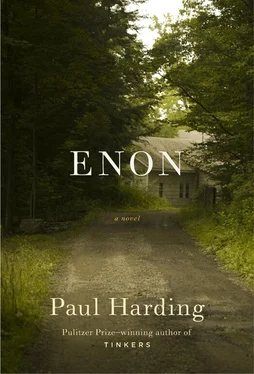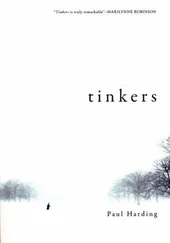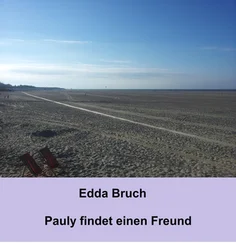At a certain point in my calculations I realized that I could no longer merely draw symbols on the wall, that to catch Kate on the wing, to contrive a machine that could hold something like a part of her absence, I had to bring the figures I was making out into the space of the room.
It was night by then. Daylight had drained from the house. I tossed the piece of chalk in my hand into the bucket and switched on the three lamps in the living room. Their light seemed not bright enough, so I removed their shades. Still their light did not seem bright enough for me to get a proper look at my drawings on the wall, so I moved them closer. Still there was not enough light, so I brought in four other lamps from other parts of the house and plugged them all into a power strip, and the light was not enough still. I stood back from the wall and looked at my drawings. They began on the upper left part of the wall as straight lines of equations and veered downward in anticline toward the center of the wall into primitive-looking pictures and icons. It seemed almost as if the characters were being pulled by some force toward the middle of the wall, and as the strata of letters and numbers drew closer to the center they spontaneously turned into the little animals and stars and bottles of cough syrup that they really were, right before they were vacuumed into a black hole.
There was no hole in the middle of the wall, though. There was nowhere for the drawings to be pulled into, no crucible, no alembic inside of which they could properly react. I could see the dead center of the wall, where it was still white and unmarked, right where a hole needed to be made to break the plane to allow the numbers and letters and animals and people to spin, move, whirl into the hole, be transformed, and possibly reemerge.
I need the hole saw, I thought.
“You are a ragpicker,” a voice said.
My grandfather’s toolbox was in the garage. I stepped outside. The hurricane loomed, bearing down toward Enon, out over the dark ocean, where fire-breathing whales plunged into valleys and breached from the peaks of the mountains of water it raised and overturned within the eons of each moment. The heavy wind sounded like waterfalls cascading in the trees. I opened the bay door of the garage. The streetlamp across the road projected pendulums of light through the trees in front of it and against the back wall of the garage, where they swung in an arc, in a steady rhythm. The wind on the serrated edge of the hurricane spun for the moment in strict tempo, and I thought that if the storm stopped traveling, and just remained, hung high above the village, spinning in place, and if it were fed the same diet of pressure and water and temperature, at a constant rate, it would be like a great, single-geared clock turning above us in the sky. We could set our watches to it. We might learn to make little hurricanes ourselves, to wear on our wrists to tell time.
“Doesn’t it sound like waterfalls, Kate?” I said. I stood before the open bay of the garage. I pretended Kate was standing just behind me, to my right.
“Some of the first clocks made were powered by water. Clepsydras, they were called. Water clocks were called clepsydras. Grampy told me that.”
I carted the toolbox into the living room. I plugged my grandfather’s drill into an outlet and fitted the drill with the hole saw. I measured the exact center of the wall with a tape measure and marked the spot with a pencil. I pressed the drill against the wall and pulled the trigger and leaned into the drill and the drill opened a hole in the middle of the wall. It felt like a seal breaking when the hole opened and I stopped panting and drew a deep breath. It felt as if the air in the room were being vacuumed into the hole. I stepped back and surveyed the wall. The hole was too raw, too inelegant, too small. I traced a larger circle around the hole, using the mouth of a mop bucket from the basement. The house moaned and sighed under the weight of the gathering wind. I cut the larger circle out of the wall with my grandfather’s reciprocating saw. The air filled with plaster dust that rippled and turned like liquid. It made paste in the back of my throat and glue in my nose. Standing back, I thought it looked like the hole gaped and gulped down everything I’d drawn, with blind, deaf, and dumb appetite. It simply devoured. So I yanked out a couple yards of aluminum foil from the roll in one of the kitchen drawers and tore it into long strips and folded the strips over three times each and pressed them flat and stapled them around the rim of the hole in the wall. That looked funny and ham-fisted, too. I wanted a whirlwind, a vortex, the eye of a storm, the crater of a volcano. I wanted the hole to spin and churn and vomit light and gulp it back up again and transform it into something I’d never seen and the light to have a voice and to speak a word that said Kate was okay and showed her well and transfigured and became the heart in my chest and the love welling up behind my ribs and the anger seizing my throat and the murder churning in my eyes and the sulfur burning in my nose and the hurricane howling in my ears and the fury in my cup and I wanted the hole to be the rent veil and even in my stupor I could see that the machine I was dumbly improvising out of candles and copper wire and brass leaf and teakwood and tiger’s teeth and heavy coins and blue pearls was a grotesque demolition of my own home and not the beautiful altar I intended.
The paste in the freezer had crystallized. I put it in a coffee filter and squeezed the liquid from the filter into another ramekin and drew it up with an old children’s medicine syringe I’d found in a plastic food container in the back of one of the kitchen cabinets, among old inhalers and droppers and thermometers. I had given Kate medicine with the syringe when she’d been too young to take it from a spoon. I stood at the kitchen counter and stuck the syringe into my mouth and pushed the plunger about halfway down the barrel. The liquid was cold and acrid. Before any time elapsed for my better self to argue with my lesser self, I pushed the plunger another quarter down the barrel. Just to make sure because that first squirt wasn’t quite halfway, I thought.
“Three-quarters of eight pills; that’s, what? Jesus, it’s like five pills — no, six. Wait, is that right? And those four others. Charlie, you’re going on a ride .”
I shuffled back to the living room. The floor was strewn with tools. The couch was covered in plaster and dust. I tried to read what I’d written on the wall and to follow the equations and improvised ideograms as they drained toward the hole in the plaster which looked pathetic now, fringed in aluminum like a kid’s attempt at a special effect for a homemade science-fiction movie. The first wave of the drugs swelled over my brain and I cursed myself for making such a wreck of the living room, especially the couch, where I wanted to lie down and float away.
“Ha, you just signed up for some housecleaning, Charlie Crosby,” I said. “Ah, Kate, your dad’s as big a jackass as he ever was. Bigger, in fact. Your dad’s a big, stubborn, born-and-bred chump.” I smiled. Kate loved the word “chump.” I used it once to describe someone I’d done a job for and when she heard it she clapped her hands and threw her head back and laughed out loud. “Chump! What’s that?”
“Kind of a jerk,” I said. “Kind of a numbskull. You should look it up in the dictionary.” Kate hauled out the dictionary I kept in the living room next to the couch.
“It’s the sawed-off end of a log,” she said, holding the dictionary up to her face and squinting. Why don’t I get my act together and make an appointment for her at the eye doctor’s? I thought. “It’s like ‘chunk’ and ‘stump’ stuck together! Like a block of wood.”
Читать дальше












